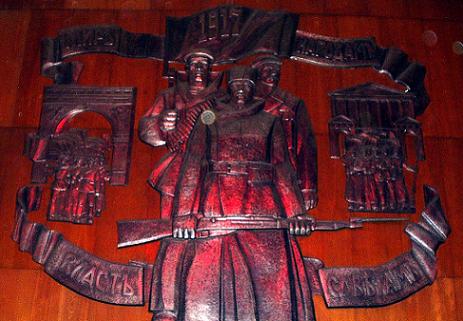Russian Cases: «Дательный падеж» [Dative] Posted by josefina on Jun 21, 2009 in History, language
And where might one find this bold statement made out of red metal on red wood pictured above? I found it in an old and forgotten «дом культуры» [‘house of culture’] in Krasnoyarsk in July 2005. What does it say, anyway? «Мир народам, власть советам» [“Peace to the peoples, power to the soviets”] written in old school Russian with the «ъ» [hard sign] at the end of masculine words which was what they did before another important Russian revolution of 1917 – the Orthography Revolution.
The Soviet kitsch on the picture above isn’t solely opening today’s post because it is worth sharing with the world, but because it contains two whole constructions with the dative case, and that is – incidentally – what we’re going to discuss today: «дательный падеж» [dative case]. In this case the question «Что?» [‘what?’] becomes «Чему?» [‘what?’] and «Кто?» [‘who?’] turns into «Кому?» [‘who/whom?’]. Masculine nouns that end on a consonant get an «у» added on to the end of the word, which means that the male professions «врач» [doctor] and «шахтёр» [miner] become «врачу» (note how the stress in this word falls on the last vowel!) and «шахтёру» in dative case. Masculine nouns that end on the soft sign – «ь» – receive the same kind of ending, but a soft one in the form of the letter «ю». Thus «водитель» [driver] turns into «водителю» and «учитель» [teacher] to «учителю». Female nouns that end on an «а» change that letter into a «е»; for example «учительница» [teacher] becomes «учительнице» and «продавшица» [saleslady; salesgirl] turns into «продавшице». Female nouns that end on «ь» [soft sign] on the end – mostly this is abstract words like «возможность» [possibility; opportunity] and «жидкость» [fluid; liquid] – receive their ‘dative case change’ in the form of the letter «и». Thus in dative the two words above will look like this: «возможности» and «жидкости». And how about «средний род» [neuter]? Even though neuter will pretend to be its own grammatical unit, it is only really so in the first nominative case, because that’s when you can see that the neuter words have an «о», like the word «озеро» [lake], or a «е», like in «знание» [knowledge], at the end of them – which is, as we all know, the first sign of a word being neuter. But when you start changing these words in different cases you’ll soon come to find out that most of them behave just as if had they been masculine! Both of the words receive letters at the end according to the same rule that goes for masculine nouns. Thus «озеро» becomes «озеру» (because «о» is considered a hard vowel) and «знание» turns into «знанию» (since «е» is a hard vowel).
Clearly, we should discuss the ‘sexes’ of Russian nouns more. I’ll make a note of it and promise to return to it. But for today, let’s go ahead and go through some of the basics concerning the case of the day – dative!

This is a Russian/Soviet classic: «Миру мир» [‘Peace to the world’]. The Russian word «мир» means both peace and world and that’s why you can write tricky sentences like this one. But that’s not why scholars are still discussing what Tolstoy actually meant with the title of his little fictional work «Война и мир» [“War & Peace”], but because the old Russian word «мiр» used to mean ‘society’ way back when…
The dative case is, as is the general rules with Russian’s six cases, closely linked with a couple of verbs that always demand to be followed by it. For example:
«звонить/позвонить» – [to call]
«Позвони мне!» – [call me!]
«Я звонил другу весь день, но тот трубку не берёт» – [I’ve been calling my freind all day, but he isn’t answering; lit.: ‘but he doesn’t pick up the reciever].
Dative is mostly famous for being the case used in IMPERSONAL CONSTRUCTIONS. Yes, we have reached the very core of the mysterious Russian language! Let’s have a look at a few ways to express an ‘impersonal construction’ using the dative case.
«Вам не холодно?» – [Aren’t you cold?]
«Не стыдно вам!» – [Aren’t you ashamed of yourselves!]
«Им не кажется, что этот ресторан – дорогой» [It doesn’t seem to them that this restaurant is expensive].
«Тебе это не нужно» – [You don’t need this].
«Ему хочется спать/есть/пить» – [He is tired/hungry/thirsty].
«Нам пора пойти домой» – [It is time for us to go home].
«Ей придётся пересдать на водительские права» – [She’ll have to retake the driver’s license test].
«Как это ему удалось, не знаю!» – [I don’t know how he succeeded with this!]
«Брату нездоровится» – [My brother is feeling ill].
«Сестре надоело ждать меня» – [My sister got tired of waiting for me].
«Петру, наверное, скучно одному на даче» – [Pyotr is probably bored alone in the summer house].
«Матери некогда» – [Mother has no time].
«Мне лень готовить и прибираться» – [I’m too lazy to cook and clean].
The dative case is also used in constructions with numbers expressing AGE:
«Сколько тебе лет?» – [How old are you?]
«Мне 32 (тридцать два) года» – [I’m thirty-two years old].
«Бабушке Маше недавно исполнилось 88 (восемьдесят восемь) лет» – [Granny Masha recently turned 88].
«Петру будет 12 (двенадцать) зимой» – [Pyotr will turn twelve in the winter].
«Моему городу почти 500 (пятьсот) лет» – [My town is almost five hundred years old].
This is, of course, not everything there is to know about the dative case in Russian language, it’s more of a ‘brief introduction’ but I hope that you got the general idea. Dative expresses the indirect object, or an impersonal object in Russian language, and is highly important, because with it one must express almost all Russian emotions! By the way, my finals are over for this year, I got straight A’s and am now officially halfway to a master’s in Russian literature! And what does that mean? That I’ll have more time to blog, of course!

Build vocabulary, practice pronunciation, and more with Transparent Language Online. Available anytime, anywhere, on any device.





Comments:
Darren:
I remember this Soviet “kitsch” quite well as I lived in Krasnoyarsk for more than 3 years during the 90’s. If I only had Transparent products back then to help me learn. Oh the embarrassment I could have avoided!
Thanks for a great blog and great products!